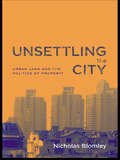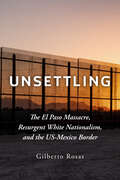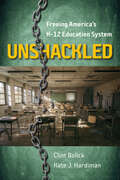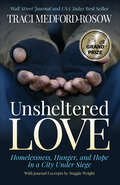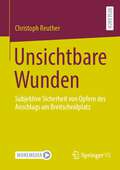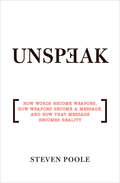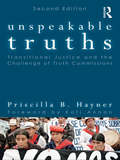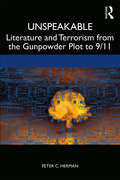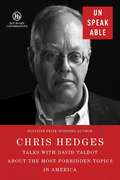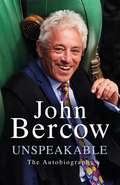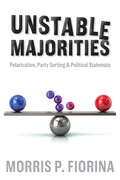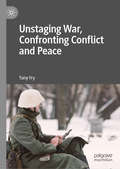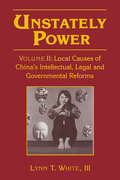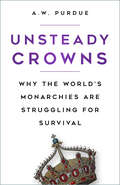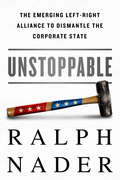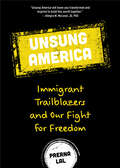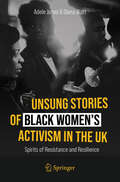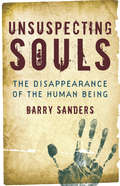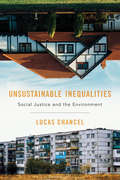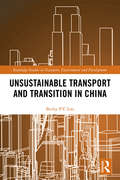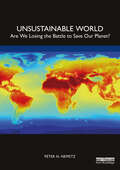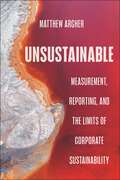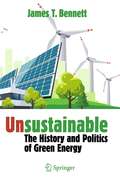- Table View
- List View
Unsettling the City: Urban Land and the Politics of Property
by Nicholas BlomleyShort and accessible, this book interweaves a discussion of the geography of property in one global city, Vancouver, with a more general analysis of property, politics, and the city.
Unsettling: The El Paso Massacre, Resurgent White Nationalism, and the US-Mexico Border
by Gilberto RosasDocuments the cruel immigration policies and treatment toward border crossers on the US-Mexico border.On August 3, 2019, a far-right extremist committed a deadly mass shooting at a major shopping center in El Paso, Texas, a city on the border of the United States and Mexico. In Unsettling, Gilberto Rosas situates this devastating shooting as the latest unsettling consequence of our border crisis and currents of deeply rooted white nationalism embedded in the United States. Tracing strict immigration policies and inhumane border treatment from the Clinton era through Democratic and Republican administrations alike, Rosas shows how the rhetoric around these policies helped lead to the Trump administration's brutal crackdown on migration—and the massacre in El Paso. Rosas draws on poignant stories and compelling testimonies from workers in immigrant justice organizations, federal public defenders, immigration attorneys, and human rights activists to document the cruelties and indignities inflicted on border crossers. Borders, as sites of crossings and spaces long inhabited by marginalized populations, generate deep anxiety across much of the contemporary world. Rosas demonstrates how the Trump administration amplified and weaponized immigration and border policy, including family separation, torture, and murder. None of this dehumanization and violence was inevitable, however. The border zone in El Paso (which translates to "the Pass") was once a very different place, one marked by frequent and inconsequential crossings to and from both sides—and with more humane immigration policies, it could become that once again.
Unshackled: Freeing America’s K–12 Education System
by Clint Bolick Kate J. HardimanClint Bolick and Kate J. Hardiman begin with a thought experiment: how would we structure a 21st-century K–12 school system if we were starting from scratch, attending to contemporary parental needs and harnessing the power of technology? Maintaining that the status quo is unacceptable, they take a forward-thinking look at how choice, competition, deregulation, and decentralization can create disruptive innovation and reform education for all students.The US Supreme Court proclaimed 65 years ago in Brown v. Board of Education that our schools must provide equal educational opportunities, but as Bolick and Hardiman argue we have yet to make good on that promise. School systems are bound to antiquated structures, outdated technology, and bureaucratic systems that work for adults, not children. The COVID-19 pandemic has highlighted how ossified the traditional public school system has become. Today's ruptures in traditional learning create opportunity for reinvention. Unshackled explains that technology can redefine the ways students learn in and out of the classroom and highlights the benefits of expanding educational freedom so that families are able to choose an education that fits their child's needs.
Unsheltered Love: Homelessness, Hunger and Hope in a City Under Siege
by Traci Medford-RosowUnsheltered Love provides a first-hand reported account of how the homeless in New York City survived the pandemic.
Unsichtbare Wunden: Subjektive Sicherheit von Opfern des Anschlags am Breitscheidplatz
by Christoph ReutherSpätestens seit den Anschlägen am 11. September 2001 ist der islamistische Terrorismus in westlichen Ländern angekommen, so auch in Deutschland. Der Angriff am Breitscheidplatz in Berlin hinterließ neben 13 Toten eine Vielzahl von Verletzten, die teils Jahre später noch unter den Folgen leiden, darunter Panikattacken und Flashbacks. Wie geht es diesen Menschen heute? Leiden sie weiterhin unter den psychischen Folgen? Wie beurteilen sie die staatlichen Reaktionen auf den Angriff? Die Untersuchung greift jene Fragen auf und nimmt mit dem Blick auf die subjektive Sicherheit eine Opferperspektive ein.
Unspeak: How Words Become Weapons, How Weapons Become a Message, and How That Message Becomes Reality (Books That Changed the World)
by Steven Poole“A sharply articulated, well-documented expos of the political and economic manipulation of language . . . Fans of Orwell, take heart.”—Kirkus ReviewsWhat do the phrases “pro-life,” “intelligent design,” and “the war on terror” have in common? Each of them is a name for something that smuggles in a highly charged political opinion. Words and phrases that function in this special way go by many names. Some writers call them “evaluative-descriptive terms.” Others talk of “terministic screens” or discuss the way debates are “framed.” Author Steven Poole calls them Unspeak. Unspeak represents an attempt by politicians, interest groups, and business corporations to say something without saying it, without getting into an argument and so having to justify itself. At the same time, it tries to unspeak—in the sense of erasing or silencing—any possible opposing point of view by laying a claim right at the start to only one way of looking at a problem. Recalling the vocabulary of George Orwell’s 1984, as an Unspeak phrase becomes a widely used term of public debate, it saturates the mind with one viewpoint while simultaneously makes an opposing view ever more difficult to enunciate. In this fascinating book, Poole traces modern Unspeak and reveals how the evolution of language changes the way we think.“Unspeak deserves a place in every journalist’s vocabulary.”—Slate“This book takes no word at face value, which will anger some and enlighten others, just as a book of social and linguistic commentary should.”—Publishers Weekly“As we approach yet another political campaign season, this remarkable new book examines the intersection where words and politics collide.”—Tucson Citizen
Unspeakable Truths: Transitional Justice and the Challenge of Truth Commissions
by Priscilla B. HaynerIn a sweeping review of forty truth commissions, Priscilla Hayner delivers a definitive exploration of the global experience in official truth-seeking after widespread atrocities. When Unspeakable Truths was first published in 2001, it quickly became a classic, helping to define the field of truth commissions and the broader arena of transitional justice. This second edition is fully updated and expanded, covering twenty new commissions formed in the last ten years, analyzing new trends, and offering detailed charts that assess the impact of truth commissions and provide comparative information not previously available. Placing the increasing number of truth commissions within the broader expansion in transitional justice, Unspeakable Truths surveys key developments and new thinking in reparations, international justice, healing from trauma, and other areas. The book challenges many widely-held assumptions, based on hundreds of interviews and a sweeping review of the literature. This book will help to define how these issues are addressed in the future.
Unspeakable: Literature and Terrorism from the Gunpowder Plot to 9/11
by Peter C. HermanUnspeakable: Literature and Terrorism from the Gunpowder Plot to 9/11 explores the representation of terrorism in plays, novels, and films across the centuries. Time and time again, writers and filmmakers including William Shakespeare, Joseph Conrad, Henry James, Gillo Pontecorvo, Don DeLillo, John Updike, and Steven Spielberg refer to terrorist acts as beyond comprehension, “a deed without a name,” but they do not stop there. Instead of creating works that respond to terrorism by providing comforting narratives reassuring audiences and readers of their moral superiority and the perfidy of the terrorists, these writers and filmmakers confront the unspeakable by attempting to see the world from the terrorist’s perspective and by examining the roots of terrorist violence.
Unspeakable: Talks with David Talbot about the Most Forbidden Topics in America
by Chris Hedges David TalbotChris Hedges on the most taboo topics in America, with David Talbot.The War on Terror is a profitable crusade against convenient enemies. "Muslim rage" is an understandable response to US state terror. Rising oligarchy in America has made democracy a sham and turned the electoral process into an increasingly absurd circus. Police violence against minorities is part of a systematic effort to crush social discontent. Proliferating violence against women's health clinics is part of the war on women's bodies. Freedom of speech is an illusion, with government agencies and corporate media dictating acceptable boundaries of public discourse. America's only hope is a revolution to create genuine structures of popular power.This kind of insight into America's deeply troubled current state cannot be found on television, in the pages of leading newspapers, or on Google News. Many of our most important thinkers are relegated to the shadows because their ideas are deemed too radical-or true-for public consumption. Among these intellectual bomb throwers is Chris Hedges, who, after decades on the front lines, continues to confront power in America in the most incisive, challenging ways.Hedges's unfettered conversation with Hot Books editorial director David Talbot- founder of Salon and author of New York Times bestseller, The Devil's Chessboard: Allen Dulles, the CIA and the Rise of America's Secret Government-will be the first in a series for Hot Books called "Unspeakable," featuring some of the most important - and censored - voices in the world today.
Unspeakable: The Sunday Times Bestselling Autobiography
by John BercowWhen John Bercow retired as Speaker of the House of Commons on 31 October 2019, he had become one of the most recognisable and iconoclastic figures in British politics, occupying a ringside seat during one of the most febrile periods in modern British history. In his no-holds-barred memoir, he offers verdicts on the leading figures of his era - from Tony Blair to David Cameron, Theresa May to Boris Johnson, and charts his extraordinary political journey. UNSPEAKABLE is essential reading for anyone interested in politics and how our democracy is - or should be - run.
Unspeakable: The Sunday Times Bestselling Autobiography
by John BercowWhen John Bercow retired as Speaker of the House of Commons on 31 October 2019, he had become one of the most recognisable and iconoclastic figures in British politics, occupying a ringside seat during one of the most febrile periods in modern British history. In his no-holds-barred memoir, he offers verdicts on the leading figures of his era - from Tony Blair to David Cameron, Theresa May to Boris Johnson, and charts his extraordinary political journey. UNSPEAKABLE is essential reading for anyone interested in politics and how our democracy is - or should be - run.
Unspoken Politics: Implicit Attitudes and Political Thinking (Cambridge Studies in Public Opinion and Political Psychology)
by Efrén O. PérezThis book explains why people acquire implicit attitudes, how they affect political thinking, and where in the mass public they have their strongest - and weakest - influences. A theoretically ambitious book, Unspoken Politics establishes that implicit attitudes exist outside the tightly controlled confines of the laboratory, showing that they emerge in a public opinion survey setting, which underlines their real-world impact. It also lays bare, in painstaking detail, the mechanics of a leading measure of implicit attitudes, the implicit association test (IAT). Accordingly, it outlines the strengths and limitations of this measure, while providing an illustration of how to develop an IAT for one's own purposes. By explaining how to analyze and interpret the data produced by the IAT, this book leads to a better understanding of people's unspoken cognitions and the impacts these have on the politics that individuals openly profess. Mounts an extended conceptualization of implicit attitudes and their implications for political thinking. Illuminates the mechanics of a leading measure of implicit attitudes, the Implicit Association Test, and applies it to US immigration politics. Will appeal to those scholars who are in need of theoretical guidance about the political impact of implicit attitudes on mass decision-making.
Unstable Majorities: Polarization, Party Sorting, and Political Stalemate
by Morris P. FiorinaAmerica is "currently fighting its second Civil War." Partisan politics are "ripping this country apart." The 2016 election "will go down as the most acrimonious presidential campaign of all." Such statements have become standard fare in American politics. In a time marked by gridlock and incivility, it seems the only thing Americans can agree on is this: we're more divided today than we've ever been in our history. In Unstable Majorities Morris P. Fiorina surveys American political history to reveal that, in fact, the American public is not experiencing a period of unprecedented polarization. Bypassing the alarmism that defines contemporary punditry, he cites research and historical context that illuminate the forces that shape voting patterns, political parties, and voter behavior. By placing contemporary events in their proper context, he corrects widespread misconceptions and gives reasons to be optimistic about the future of American electoral politics.
Unstaging War, Confronting Conflict and Peace
by Tony FryThis book presents the concept of ‘unstaging’ war as a strategic response to the failure of the discourse and institutions of peace. This failure is explained by exploring the changing character of conflict in current and emergent global circumstances, such as asymmetrical conflicts, insurgencies, and terrorism. Fry argues that this pluralisation of war has broken the binary relation between war and peace: conflict is no longer self-evident, and consequentially the changes in the conditions, nature, systems, philosophies and technologies of war must be addressed. Through a deep understanding of contemporary war, Fry explains why peace fails as both idea and process, before presenting ‘Unstaging War’ as a concept and nascent practice that acknowledges conflict as structurally present, and so is not able to be dealt with by attempts to create peace. Against a backdrop of increasingly tense relations between global power blocs, the beginnings of a new nuclear arms race, and the ever-increasing human and environmental impacts of climate change, a more viable alternative to war is urgently needed. Unstaging War is not claimed as a solution, but rather as an exploration of critical problems and an opening into the means of engaging with them.
Unstately Power: Local Causes of China's Intellectual, Legal and Governmental Reforms (Unstately Power Ser. #Vol. 2)
by Lynn T. White, IIIA critique of America's flawed Asia policy that centres on US-Japan relations but harkens back to the same disastrous views that drew America into Vietnam. The technique is a narrative flow of short vignettes woven into longer chapters; the main strands are personal reflections and interviews.
Unsteady Crowns: Why the World’s Monarchies are Struggling for Survival
by A. W. PurdueWar and austerity, unrest and revolution: the institution of monarchy has remained stalwart through every challenge levelled at it, but just what is its role and how secure is its future in our modern society?At the beginning of the twentieth century, monarchy was by far the most common form of government: emperors sat on the thrones of Germany, Austria–Hungary, Persia, Japan, China, Russia and the Ottoman Empire, while there were kings of Bulgaria, Serbia, Italy, Romania, Greece, Korea and Cambodia. After he lost his throne in 1952, King Farouk of Egypt predicted that by the end of the century there would be only five kings: the kings of hearts, aces, clubs and spades, and the King of England. That prediction has not come true, for there remain monarchs across the globe. The number of monarchies has appreciably diminished, yet the idea continues to have allure.In Unsteady Crowns, historian A.W. Purdue explores the important role played by monarchies as agents of continuity, guarding and representing the national ethos, and brings the story up to date in a fully revised second edition, exploring the roles of celebrity, rivalry, and much more in monarchies worldwide.
Unstoppable: The Emerging Left-Right Alliance to Dismantle the Corporate State
by Ralph NaderRalph Nader has fought for over fifty years on behalf of American citizens against the reckless influence of corporations on our society. At this pivotal political moment, Americans are more disillusioned with their political leaders than ever. Large majorities tell pollsters that big corporations have too much political power. The ever tightening influence of big business on the mainstream media, elections and our local, state and federal governments, have caused many Americans to believe they have no political voice.In Unstoppable, Nader ramps up the fight and makes a hugely persuasive case that American citizens are not powerless. Unstoppable is about the emerging political re-alignment that is combining the Left and the Right against converging corporate-government tyranny. Large segments from the progressive, conservative, and libertarian political camps find themselves aligned in opposition to the destruction of civil liberties, the bloated and economically draining corporate welfare state, the relentless perpetuation of America's wars, sovereignty-shredding free trade agreements, and the unpunished crimes of Wall Street against Main Street. These are all issues that can be traced back to the growing influence of corporate goliaths and their ability to combine forces with indentured government against the interests of the broader public.Nader draws on half a century of his own experience working with the grassroots and Congress and tells of many surprising victories that have united progressive and conservative forces. As a participator in and keen observer of these budding alliances, he breaks new ground in showing how these coalitions can overcome specific obstacles that divide and rule them and expand their power on Capitol Hill, in the courts, and in the arena of public opinion. Nader provides a blueprint for how Americans on both sides of the aisle can fight against the corporate state and crony capitalism. Nader shows how they can reclaim their right to consume safe foods and drugs, breathe clean air, receive fair rewards for their work, regain control of taxpayer assets, and achieve a more self-reliant economy.Far from espousing 'let's meet half-way' type compromises, Nader argues that it is in the interest of citizens of different political labels to join in the struggle against the corporate state that will, if left unchecked, ruin the Republic, shred our constitution, and stampede over the rights of the American people.
Unsung America: Immigrant Trailblazers and Our Fight for Freedom
by Prerna LalReal immigrant perspectives of America&’s immigration system, perfect for fans of The Book of Awesome Women, Dear America, or American Like Me. Positive and heroic stories. Far too often, immigrants are demonized and scapegoated, when they should be celebrated as heroes and revolutionaries. This book strings together both triumphant and painful tales of immigrants who blazed trails and broke barriers in the fight for fundamental human rights.Unsung Heroes. These are ordinary people who have used their own stories on the fight for citizenship to illustrate their triumphs and trials as immigrants in a new land. Each uses a different strategy and tactics; what works for one does not work for another. They all have one thing in common, however―a desire for racial and social justice.Unsung America will transform how you view immigrants and refugees. In this celebratory book, you will discover:· Powerful theories of social change, and how what seems radical in one era can be normalized in the next· How the fight for citizenship is interconnected and interrelated to other struggles such as the civil rights movement and the LGBTQ movement· Stories about ordinary people doing extraordinary things and how you, too, can be a force for good in the worldPraise for Unsung America &“Unsung America...pushes us to interrogate our violent immigration system and also uplifts the people whose contributions are too often erased.&”—Tina Vasquez, senior immigration reporter at Rewire News &“Lal lays out a timeline…that vividly chronicles the birth and impact of certain policies, views, and opinions within the realm of immigration policy.&”—Juan Escalante, Digital Campaigns Manager at FWD.us
Unsung Stories of Black Women’s Activism in the UK: Spirits of Resistance and Resilience
by Adele Jones Diana WattThis book is a long-overdue contribution to the history of Black feminist activism in the UK. It provides unique insights into both historical and contemporary issues that impact Black women, their families and their communities, including immigration, education, policing, domestic violence and poverty. It fills a void in sociological and feminist literature by centring the voices, lived experiences and perspectives of women of the African and Caribbean Diaspora in the UK. Through the use of research, archival materials, narrative interviews, photographs, poems and reflective conversations, the authors explore the social issues which inspired these women's action for change. In drawing on personal and professional testimonies grounded in over two decades of community activism and scholarly analysis, the authors weave together the story of the Abasindi Cooperative, a woman’s organisation famed for its progressive and far-reaching social justice programmes. In so doing the authors reveal narratives of political struggle that have their resonance in present-day society. This book is an acknowledgment and celebration of the sociopolitical activism and achievements of Black women in the UK and represents the hope, solidarity and triumph possible when women organise collectively to tackle social and racial injustice.
Unsuspecting Souls: The Disappearance of the Human Being
by Barry SandersIn Unsuspecting Souls, Barry Sanders examines modern society's indifference to the individual. Beginning with the Industrial Revolution, when care for human beings began to disappear slowly, and ending with the modern era, when societal events require less person-to-person interaction and introduce radical changes in common attitudes toward death and life, Sanders laments that what makes us most human is slowly dying. Our days are filled with a continuous bombardment of "information" that demands our attention and brings us out of our world and into a sterile one of inhumanity and abstraction.We've also lost the original sense of a collective consciousness. This loss has been culminating for two centuries now, dating back to the rise of European powers and worldwide colonization. We pick our poisons among several forms of radical fundamentalisms, each one not only a threat to the other but a threat to humanity itself. From references of Edgar Allan Poe to Abu Ghraib, this is a fascinating and worrisome story, impeccably researched and compellingly written.
Unsustainable Inequalities: Social Justice And The Environment
by Lucas ChancelA hardheaded book that confronts and outlines possible solutions to a seemingly intractable problem: that helping the poor often hurts the environment, and vice versa.Can we fight poverty and inequality while protecting the environment? The challenges are obvious. To rise out of poverty is to consume more resources, almost by definition. And many measures to combat pollution lead to job losses and higher prices that mainly hurt the poor. In Unsustainable Inequalities, economist Lucas Chancel confronts these difficulties head-on, arguing that the goals of social justice and a greener world can be compatible, but that progress requires substantial changes in public policy.Chancel begins by reviewing the problems. Human actions have put the natural world under unprecedented pressure. The poor are least to blame but suffer the most—forced to live with pollutants that the polluters themselves pay to avoid. But Chancel shows that policy pioneers worldwide are charting a way forward. Building on their success, governments and other large-scale organizations must start by doing much more simply to measure and map environmental inequalities. We need to break down the walls between traditional social policy and environmental protection—making sure, for example, that the poor benefit most from carbon taxes. And we need much better coordination between the center, where policies are set, and local authorities on the front lines of deprivation and contamination.A rare work that combines the quantitative skills of an economist with the argumentative rigor of a philosopher, Unsustainable Inequalities shows that there is still hope for solving even seemingly intractable social problems.
Unsustainable Transport and Transition in China (Routledge Studies in Transport, Environment and Development)
by Becky PY LooThis book discusses various transport sustainability issues from the perspective of developing countries, exploring key issues, problems and potential solutions for improving transport sustainability in China. It first reviews the current transport sustainability baselines in the three key dimensions of environmental, economic and social sustainability, via an international comparison encompassing both developed and developing countries in different world regions. Then, with a time frame up to 2030, the study groups 100 major Chinese cities according to their baseline conditions, projected population and economic growth, and common sustainability challenges in passenger transport. A systematic attempt is made to discuss the characteristics, strengths and weaknesses of various emerging sustainable transport strategies, including the metro systems, bus rapid transit, light rail, bicycles (and e-bicycles), electric vehicles and walking. Based on the different city clusters identified, the study then explores the opportunities and constraints of introducing a range of emerging sustainable transport strategies through both statistical analysis and detailed fieldwork. Future directions and challenges are identified based on official documents, onsite observations and interviews with local people. The study concludes with thoughts on sustainable transport in smart cities, the importance of governance, local participation, internal and external city movements, and towards a holistic sustainable transport plan. Unsustainable Transport and Transition in China will be of great interest to scholars interested in carbon emissions, climate change, environmental policy, planning, road safety, sustainability, transportation and urban studies, and is relevant to China and other developing countries.
Unsustainable World: Are We Losing the Battle to Save Our Planet?
by Peter N. NemetzUsing a cross-disciplinary, science- and economics-based approach, this book provides a sobering and comprehensive assessment of the multifaceted barriers to achieving sustainability at a global level. Organized into three parts, the book defines sustainability in part I and sets the context of the historical and current difficulties facing the world today. In parts II and III, it outlines the sustainability challenges faced in transportation, manufacturing, and agriculture, and then in turn addresses the solutions, conditional solutions, and nonsolutions to these challenges. These include electric and autonomous automobiles, nuclear power, renewable energy, geoengineering, and carbon capture and storage. The author attempts to differentiate among those proposed solutions and discusses which are most promising and which are infeasible, counterproductive, and potentially a waste of time and money. In each of the book’s chapters, the scientific evidence is presented in detail, in keeping with the advice of the young Swedish climate activist, Greta Thunberg, to let the science speak for itself. The author outlines why sustainability is unlikely to be achieved in several key areas of human endeavor and readers are challenged to weigh the scientific evidence for themselves. Using an economic business-based approach, this book introduces students and general readers to the challenges of sustainability and the environmental difficulties facing humanity today.
Unsustainable: Measurement, Reporting, and the Limits of Corporate Sustainability
by Matthew ArcherA behind-the-scenes look at how corporate and financial actors enforce a business-friendly approach to global sustainabilityIn recent years, companies have felt the pressure to be transparent about their environmental impact. Large documents containing summaries of yearly emissions rates, carbon output, and utilized resources are shared on companies’ social media pages, websites, and employee briefings in a bid for public confidence in corporate responsibility.And yet, Matthew Archer argues, these metrics are often just hollow symbols. Unsustainable contends with the world of big banks and multinational corporations, where sustainability begins and ends with measuring and reporting. Drawing on five years of research among sustainability professionals in the US and Europe, Unsustainable shows how this depoliticizing tendency to frame sustainability as a technical issue enhances and obscures corporate power while doing little, if anything, to address the root causes of the climate crisis and issues of social inequality. Through this obsession with metrics and indicators, the adage that you can’t manage what you can’t measure transforms into a belief that once you’ve measured social and environmental impacts, the market will simply manage them for you.The book draws on diverse sources of evidence—ethnographic fieldwork among a wide array of sustainability professionals, interviews with private bankers, and apocalyptic science fiction—and features analyses of name-brand companies including Volkswagen, Unilever, and Nestlé. Making the case for the limits of measuring and reporting, Archer seeks to mobilize alternative approaches. Through an intersectional lens incorporating Black and Indigenous theories of knowledge, power and value, he offers a vision of sustainability that aims to be more effective and more socially and ecologically just.
Unsustainable: The History and Politics of Green Energy
by James T. BennettThis book examines the history, politics, and economics of alternative energy. Since the energy crisis of the 1970s, governments around the world have subsidized and otherwise incentivized alternative forms of energy to reduce dependence on fossil fuels. This search has taken on added urgency in the twenty-first century, as the specter of climate change has engendered ambitious state-level renewable portfolio standards, enhanced federal incentives, and inspired “100% renewable” electrical generation targets in such states as Vermont and Hawaii. To save the planet from destruction, wind, solar, and other renewable energy alternatives must replace fossil fuels. But how did we get here and what is the cost? After an in-depth study of the Carter administration's synthetic fuels program, the focus shifts to the two most prominent, perhaps most promising, and certainly most promoted—and government subsidized—“green” and “renewable” energies today: wind and solar. Because wind has made the most headway and drawn the most controversy, it receives the most attention. Although the primary focus is on the American experience with renewable energy, the policies and politics of renewables in Scotland, Wales, Denmark, Spain, and other European nations are also discussed. Issues considered in the book include the nature and efficacy of renewable subsidies; the employment of federal and state tax codes to encourage renewables; the lobbies and interest groups that campaign for government support of renewables; and the fierce battles over the siting of renewable facilities. Unlike other works on this subject, the book probes in depth the nature of the opposition to wind and solar, both in the matter of siting and in their worthiness as recipients of substantial government assistance.
